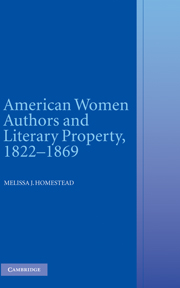Book contents
- Frontmatter
- Contents
- Preface: “Imperfect Title”
- Acknowledgments
- Introduction: “Lady-Writers” and “Copyright, Authors, and Authorship” in Nineteenth-Century America
- 1 Authors, Wives, Slaves: Coverture, Copyright, and Authorial Dispossession, 1831–1869
- 2 “Suited to the Market”: Catharine Sedgwick, Female Authorship, and the Literary Property Debates, 1822–1842
- 3 “When I Can Read My Title Clear”: Harriet Beecher Stowe and the Stowe v. Thomas Copyright Infringement Case (1853)
- 4 “Every body sees the theft”: Fanny Fern and Periodical Reprinting in the 1850s
- 5 A “Rank Rebel” Lady and Her Literary Property: Augusta Jane Evans and Copyright, the Civil War and After, 1861–1868
- Epilogue: Belford v. Scribner (1892) and the Ghost of Mary Virginia Terhune's Phemie's Temptation (1869); or, The Lessons of the “Lady-Writers” of the 1820s through the 1860s for Literary History and Twenty-First-Century Copyright Law
- Index
5 - A “Rank Rebel” Lady and Her Literary Property: Augusta Jane Evans and Copyright, the Civil War and After, 1861–1868
Published online by Cambridge University Press: 24 July 2009
- Frontmatter
- Contents
- Preface: “Imperfect Title”
- Acknowledgments
- Introduction: “Lady-Writers” and “Copyright, Authors, and Authorship” in Nineteenth-Century America
- 1 Authors, Wives, Slaves: Coverture, Copyright, and Authorial Dispossession, 1831–1869
- 2 “Suited to the Market”: Catharine Sedgwick, Female Authorship, and the Literary Property Debates, 1822–1842
- 3 “When I Can Read My Title Clear”: Harriet Beecher Stowe and the Stowe v. Thomas Copyright Infringement Case (1853)
- 4 “Every body sees the theft”: Fanny Fern and Periodical Reprinting in the 1850s
- 5 A “Rank Rebel” Lady and Her Literary Property: Augusta Jane Evans and Copyright, the Civil War and After, 1861–1868
- Epilogue: Belford v. Scribner (1892) and the Ghost of Mary Virginia Terhune's Phemie's Temptation (1869); or, The Lessons of the “Lady-Writers” of the 1820s through the 1860s for Literary History and Twenty-First-Century Copyright Law
- Index
Summary
In his 1884 memoir, New York publisher J. C. Derby relates the story of the publication of Augusta Jane Evans's arch-Confederate novel Macaria; or Altars of Sacrifice in the North and South during the Civil War. In Derby's telling, after the beginning of the war, which had the effect of “temporarily suspending the publication of books of fiction,” he “heard occasionally through the lines from the gifted young authoress, who sent [him] in 1863 [sic], by a blockade-runner, via Cuba, a copy of her novel entitled ‘Macaria,’ published by West & Johnson [sic], then, as now, well-known booksellers in Richmond, Virginia. The volume was printed on coarse brown paper, the copyright entered according to the Confederate States of America, and dedicated ‘to the brave soldiers of the Southern Army’” (emphasis original). Unbeknownst to her, he continues, he arranged with Philadelphia publisher J. B. Lippincott to issue a Northern edition (Derby's own publishing house Derby & Jackson had failed shortly after the beginning of the war). When New York publisher Michael Doolady announced a competing edition of the work, Derby approached Doolady, who claimed “that the author being an arch rebel was not entitled to copyright and would receive none” (p. 394). Derby and Lippincott called on Doolady together and persuaded him to pay all royalties in trust to Derby, while Lippincott agreed to withdraw his edition.
- Type
- Chapter
- Information
- American Women Authors and Literary Property, 1822–1869 , pp. 192 - 238Publisher: Cambridge University PressPrint publication year: 2005

